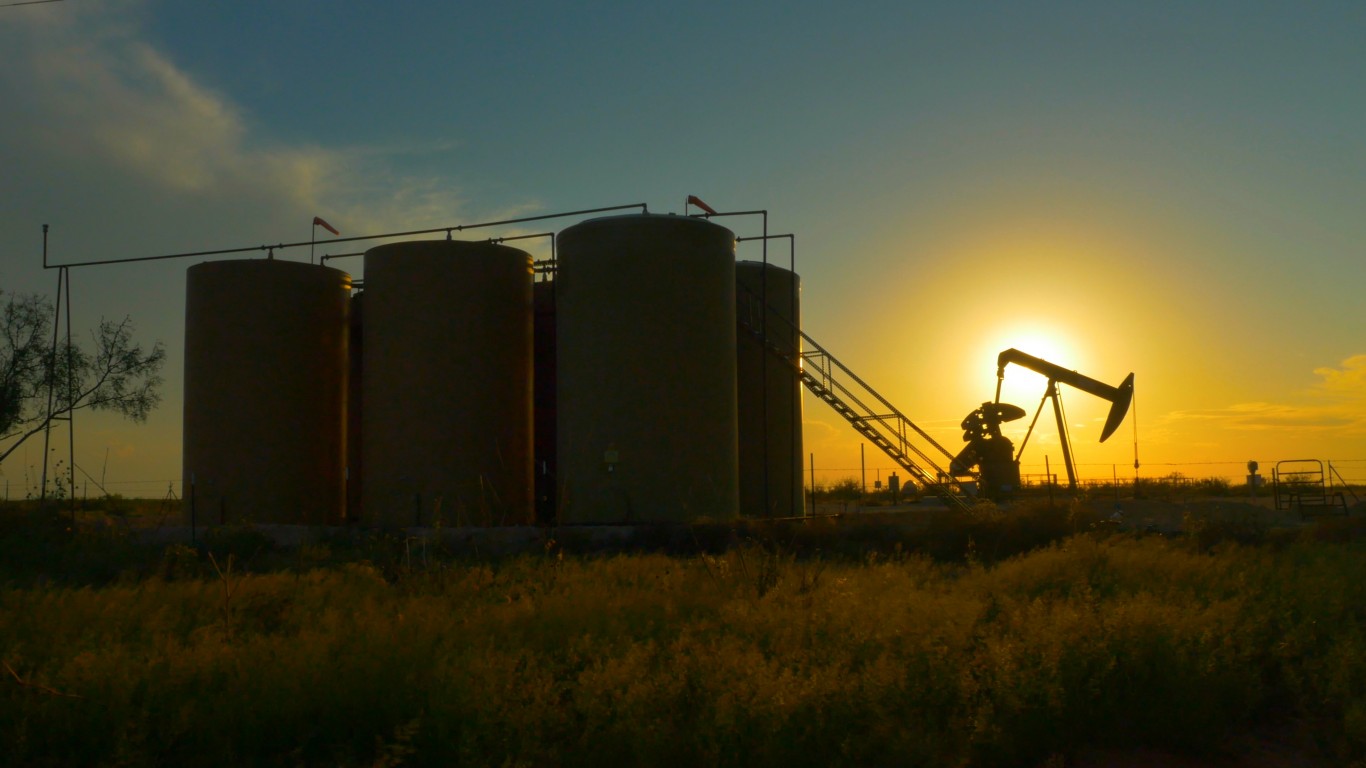Energy
US Shale Buyout Targets Are Everywhere, but Are There Buyers?

Published:
Last Updated:

Last Friday’s announcement that Chevron Corp. (NYSE: CVX) would pay $65 a share in cash and stock for Anadarko Petroleum Corp. (NYSE: APC) in a deal valued at $33 billion ($50 billion in enterprise value) appeared to come out of the blue. According to a CNBC report Monday morning, among the most surprised was Occidental Petroleum Corp. (NYSE: OXY) which, according to unnamed sources, had offered Anadarko a per-share price in the mid-$70s, about 40% of which was cash. Chevron is paying 25% in cash and 75% in stock because, again according to CNBC, Anadarko wanted more shares in Chevron than cash. Chevron’s market cap of around $229 billion is nearly five times greater than Oxy’s $47 billion.
Oxy apparently is considering taking its offer directly to Anadarko shareholders. If either Anadarko or Chevron reneges on the deal, the break-up fee is a reported 3% of the deal’s value, or around $1 billion.
This story is interesting because it demonstrates just how much value is currently being placed on oil and gas acreage in U.S. onshore basins like the Permian and the Denver-Julesburg basins. Anadarko’s holdings included 400,000 net acres in the Denver-Julesburg Basin, with more than 2 billion barrels of recoverable resource, and 600,000 net acres in the Delaware basin, holding an estimated 4 billion barrels of recoverable resources. The two basins accounted for daily production of 399,000 barrels of oil equivalent last year.
The pixels burned announcing the deal were followed quickly by lists of other shale operators in the Permian Basin who might be targets for supermajors like Exxon Mobil Corp. (NYSE: XOM), Royal Dutch Shell PLC (NYSE: RDS-A), Total S.A. (NYSE: TOT), Equinor ASA (NYSE: EQNR) and Eni SpA (NYSE: E). BP PLC (NYSE: BP) made its play last year with a $10.5 billion acquisition of BHP Billiton’s U.S. onshore assets.
Analysts at SunTrust Robinson Humphrey, and our own screen, revealed six large-cap exploration and production (E&P) companies that are reasonable acquisition targets for the supermajors: Concho Resources Inc. (NYSE: CXO), EOG Resources Inc. (NYSE: EOG), Noble Energy Inc. (NYSE: NBL), PDC Energy Inc. (NYSE: PDCE), Pioneer Natural Resources Inc. (NYSE: PXD) and SRC Energy Inc. (NYSE: SRCI). But there may be others.
Tudor Pickering Holt, for example, put Oxy in the target category now that its deal for Anadarko apparently has come to naught. The firm also cited Concho and Pioneer as good fits for Exxon.
Shell was reportedly in discussions late last year to acquire privately held Endeavor Energy Resources for a reported $10 billion, which was then knocked down to around $8 billion. Endeavor has leases on more than 373,000 net acres in the Permian’s Midland basin and produced 72,000 barrels of oil equivalent per day in the fourth quarter of 2018. Analysts at Moody’s reported last August that the company had 216 million barrels of proved reserves at the end of 2017, compared to Anadarko’s 1.47 billion at the end of 2018. That would indicate a valuation for Endeavor somewhere north of $5 billion, apparently much less than the Autry Stephens family is willing to consider.
Total said last August, following BP’s $10.5 billion acquisition, that the French company was not looking for acquisitions in U.S. shale plays. The company’s chief executive said the oil was too pricey and that it didn’t have the human resources to take on a new effort. Italy’s Eni also has kept its wallet closed to adding U.S. shale to its portfolio.
Another firm that is also unlikely to add to its U.S. shale portfolio is Equinor. The Norwegian-controlled firm formerly known as Statoil has been trying to sell some or all of its operations (82,000 net acres) in the Eagle Ford shale play in south Texas. In 2015, the company said it held leases on 410,000 net acres in the Marcellus shale play (the U.S. Appalachian region) and 249,000 net acres in the Bakken. The company has begun increasing its focus on natural gas in Europe and the United States.
In early March, Norway’s sovereign wealth fund announced that it would divest about $7.5 billion in E&P stocks from its $1 trillion fund. Among the stocks planned for divestiture were Anadarko and Oxy. Stocks in integrated oil majors like Exxon and Chevron would remain in the fund’s portfolio.
The E&P industry in the Permian Basin has been consolidating right along with some of the larger companies like Concho and Pioneer acquiring smaller ones. Now that these acquirers have reached a certain size, the next step is being acquired or growing organically. The latter option will take years and cost billions. If you were a shareholder, which option would you choose?
Start by taking a quick retirement quiz from SmartAsset that will match you with up to 3 financial advisors that serve your area and beyond in 5 minutes, or less.
Each advisor has been vetted by SmartAsset and is held to a fiduciary standard to act in your best interests.
Here’s how it works:
1. Answer SmartAsset advisor match quiz
2. Review your pre-screened matches at your leisure. Check out the advisors’ profiles.
3. Speak with advisors at no cost to you. Have an introductory call on the phone or introduction in person and choose whom to work with in the future
Thank you for reading! Have some feedback for us?
Contact the 24/7 Wall St. editorial team.